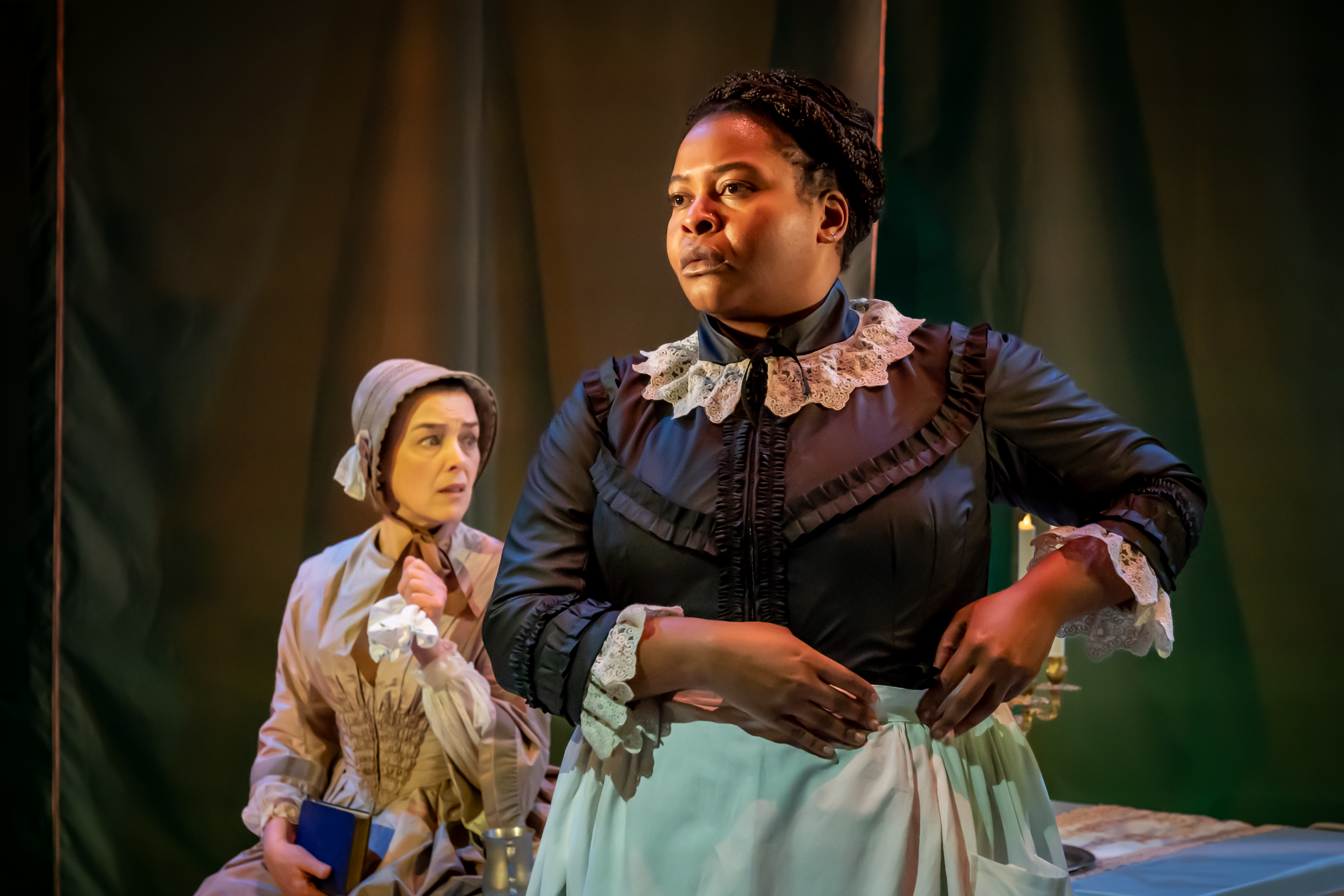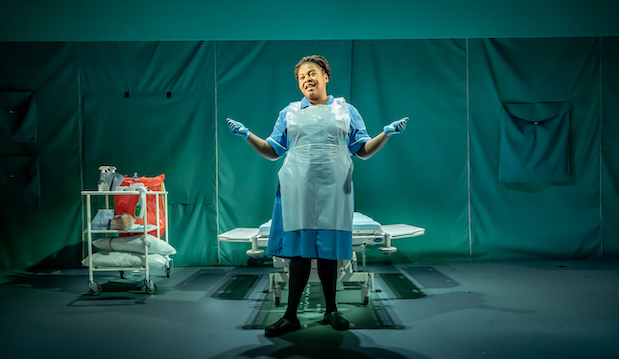Marys Seacole, Donmar Warehouse review ★★★★★
Kayla Meikle in Marys Seacole. Photo: Marc Brenner
Listen up: it’s ‘Mary fucking Seacole’ and she’s here to tell her story. American playwright Jackie Sibblies Drury reunites with the team behind her Pulitzer-winning race drama Fairview to tell the story of the 19th-century British-Jamaican nurse who made her own way to Crimea to treat soldiers wounded in the war after her application to join Florence Nightingale’s team was rejected.
The play, which runs at roughly 100 minutes straight through, is split into two acts: first, a longer, schoolbook version of Seacole’s story, with overt racism left out. The final 20 minutes is given to a shorter, second act, where the gritty reality of Seacole’s struggle for professional recognition and the discrimination she experienced along the way plays out in a dizzying, nightmarish loop, with off-hand microagressions from the first act repeated in more sinister tones.

Kayla Meikle and Olivia Williams in Marys Seacole. Photo: Marc Brenner
Marys Seacole is no straight-up period piece. Drury furthers her reputation as one of the great contemporary race writers by drawing parallels between the dismissal of Seacole as a black woman in the 1800s and the treatment of black female healthcare professionals in the Western world today – hence the plural ‘Marys’ in the title.
The story flits between 19th-century Kingston and Crimea, and 21st-century London and New York, with a parade of period dresses and contemporary NHS uniforms from designer Tom Scutt (Fairview, Cabaret) carrying characters between the centuries as the boundaries blur. Surreal sequences, including a scene in which Mary’s mother, Duppy Mary, sits motionless in front of a white mannequin-statue in a park – perhaps a comment on who we chose to deify? – adds a dose of mystery.

Kayla Meikle in Marys Seacole. Photo: Marc Brenner
Marys Seacole is, in part, a pointed commentary on how privileged white people have relied on black help to look after their houses, babies and, in the UK, ‘their’ NHS, often with no credit or even the right to benefit from the institution they’ve worked tirelessly to uphold. In one early scene set in a London hospital, two black nurses discuss the security a British citizenship would offer them, while simultaneously cleaning and feeding an elderly white patient.
A six-strong female cast of three black and three white actors – all with names similar to Mary – tell this story of caregiving and the role played by nurses, like Seacole, to carry their wards from the cradle to the grave.
Kayla Meikle (Paradise) is the bedrock of the production as a stoic, stern Mary through the ages. Esther Smith, who audiences might recall from Fairview, is an ideal conduit for Drury’s surreal style; in each of her versatile roles, including as a grumpy teenage granddaughter and a loudmouthed mother spewing everyday racisms, she’s responsible for carrying the show’s dark humour and pitching her performance at a dramatic frequency just above those around her – and it works. In contrast, Déja J Bowens, making her professional debut as Mamie, is appropriately naturalistic.

Esther Smith, Deja Bowens and Kayla Meikle in Marys Seacole. Photo: Marc Brenner
Watching Marys Seacole at the Donmar Warehouse, it’s hard to believe the play wasn’t written as a reflection on a United Kingdom wading through the aftermath of the pandemic, Brexit and the Windrush scandal, while looking out on the war in Ukraine. Drury actually wrote the play in 2019 and ran it first Off Broadway under a different creative team, but some clever rewrites and nuanced direction by Nadia Latif (Fairview) make this show land with impact on the London stage in 2022.
Scutt’s set is also to thank for the successful reimagining. An imposing teal curtain backdrop plants an early scene firmly in a contemporary NHS ward. Later, a shelling – complete with falling debris – and a slick reset of the stage moves the action to war-torn Crimea, where bloodied dummies become bodies in the care of Seacole and her fellow nurses.
One criticism, that comes from knowing what Drury is capable of after watching Fairview (which made a powerful case about causal racism then asked those who identify as white to come onto the stage), is that she could have pushed her point about black caregivers further. Sure, audience participation might have felt predictable a second time around, but much of the play’s message is left to a final speech from Llewella Gideon’s Duppy Mary, and the blocking of this scene makes it hard to hear, for those sat behind her on stage right anyway. As a result, it loses impact.
Still, Marys Seacole is another urgent production from Drury, Latif and Scutt. Let’s hope this dream team continues collaborating.
The play, which runs at roughly 100 minutes straight through, is split into two acts: first, a longer, schoolbook version of Seacole’s story, with overt racism left out. The final 20 minutes is given to a shorter, second act, where the gritty reality of Seacole’s struggle for professional recognition and the discrimination she experienced along the way plays out in a dizzying, nightmarish loop, with off-hand microagressions from the first act repeated in more sinister tones.

Kayla Meikle and Olivia Williams in Marys Seacole. Photo: Marc Brenner
Marys Seacole is no straight-up period piece. Drury furthers her reputation as one of the great contemporary race writers by drawing parallels between the dismissal of Seacole as a black woman in the 1800s and the treatment of black female healthcare professionals in the Western world today – hence the plural ‘Marys’ in the title.
The story flits between 19th-century Kingston and Crimea, and 21st-century London and New York, with a parade of period dresses and contemporary NHS uniforms from designer Tom Scutt (Fairview, Cabaret) carrying characters between the centuries as the boundaries blur. Surreal sequences, including a scene in which Mary’s mother, Duppy Mary, sits motionless in front of a white mannequin-statue in a park – perhaps a comment on who we chose to deify? – adds a dose of mystery.

Kayla Meikle in Marys Seacole. Photo: Marc Brenner
Marys Seacole is, in part, a pointed commentary on how privileged white people have relied on black help to look after their houses, babies and, in the UK, ‘their’ NHS, often with no credit or even the right to benefit from the institution they’ve worked tirelessly to uphold. In one early scene set in a London hospital, two black nurses discuss the security a British citizenship would offer them, while simultaneously cleaning and feeding an elderly white patient.
A six-strong female cast of three black and three white actors – all with names similar to Mary – tell this story of caregiving and the role played by nurses, like Seacole, to carry their wards from the cradle to the grave.
Kayla Meikle (Paradise) is the bedrock of the production as a stoic, stern Mary through the ages. Esther Smith, who audiences might recall from Fairview, is an ideal conduit for Drury’s surreal style; in each of her versatile roles, including as a grumpy teenage granddaughter and a loudmouthed mother spewing everyday racisms, she’s responsible for carrying the show’s dark humour and pitching her performance at a dramatic frequency just above those around her – and it works. In contrast, Déja J Bowens, making her professional debut as Mamie, is appropriately naturalistic.

Esther Smith, Deja Bowens and Kayla Meikle in Marys Seacole. Photo: Marc Brenner
Watching Marys Seacole at the Donmar Warehouse, it’s hard to believe the play wasn’t written as a reflection on a United Kingdom wading through the aftermath of the pandemic, Brexit and the Windrush scandal, while looking out on the war in Ukraine. Drury actually wrote the play in 2019 and ran it first Off Broadway under a different creative team, but some clever rewrites and nuanced direction by Nadia Latif (Fairview) make this show land with impact on the London stage in 2022.
Scutt’s set is also to thank for the successful reimagining. An imposing teal curtain backdrop plants an early scene firmly in a contemporary NHS ward. Later, a shelling – complete with falling debris – and a slick reset of the stage moves the action to war-torn Crimea, where bloodied dummies become bodies in the care of Seacole and her fellow nurses.
One criticism, that comes from knowing what Drury is capable of after watching Fairview (which made a powerful case about causal racism then asked those who identify as white to come onto the stage), is that she could have pushed her point about black caregivers further. Sure, audience participation might have felt predictable a second time around, but much of the play’s message is left to a final speech from Llewella Gideon’s Duppy Mary, and the blocking of this scene makes it hard to hear, for those sat behind her on stage right anyway. As a result, it loses impact.
Still, Marys Seacole is another urgent production from Drury, Latif and Scutt. Let’s hope this dream team continues collaborating.
TRY CULTURE WHISPER
Receive free tickets & insider tips to unlock the best of London — direct to your inbox
| What | Marys Seacole, Donmar Warehouse review |
| Where | Donmar Warehouse, 41 Earlham Street, Seven Dials, WC2H 9LX | MAP |
| Nearest tube | Covent Garden (underground) |
| When |
15 Apr 22 – 04 Jun 22, 7:30 PM – 9:10 PM |
| Price | £10 - £45 |
| Website | Click here for more information and to book |